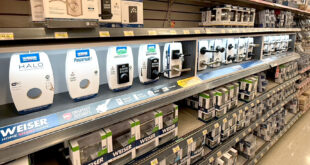
Click the picture to download a PDF of this story.
By Chad Husted, chusted@nrha.org
Feel the Power
Contractors and professional tradespeople are often in a hurry. Theirs is a business where time very much equals money, and downtime due to labor shortages, permit issues or mechanical failures are never welcome.
Many customers walking into a hardware store are looking for something that will solve a problem. For professional customers, those problems aren’t usually a few holes that need patching as much as they are a few walls that need to be framed up. Those problems need powerful solutions, and retailers can make the most of that demand in their power tool department.
Power tools can be a tricky department to nail down for retailers. While these products are often some of the most high-profile offerings available at home improvement stores, margins can be tight on big-ticket items like drills, impact drivers, saws and grinders.
While professional customers are certainly concerned with price, they balance that concern with whether the tool will do the job they need and hold up to the rigors of the workplace. How many problems can this power tool solve before they have to reinvest in another one? Hardware Retailing spoke to three retailers who have attracted professional customers with their power tool selections. They share how they’ve brought professional customers into their stores and how they’ve maintained their relationships with that customer base.
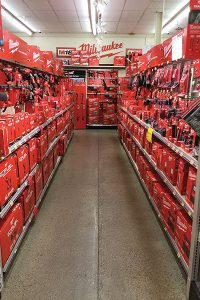 What Do Pros Want?
What Do Pros Want?
The types of power tools available in the market are as varied as the pros who use them. From homebuilders to building superintendents working on apartment complexes and municipal buildings, the needs of professionals can change daily.
For retailers, customers who work professionally with power tools can become a foundation of steady sales if targeted correctly. Gemmen’s Home & Hardware in Hudsonville, Michigan, serves a market that is mostly geared toward smaller operations, such as municipal workers who are involved in a variety of projects in multiple buildings, like in a school district.
According to company president and owner Andrew Gemmen, these customers are not making large orders for fully outfitted construction crews.
“Portability is key for this market, and we’ve devoted more of the salesfloor to those products as opposed to stationary tools,” Gemmen says.
By catering their product selection and even store hours to this customer base, Gemmen’s Home & Hardware has built a loyal following among power tool users.
Branneky True Value Hardware serves a similar type of market just outside St. Louis in Bridgeton, Missouri. Co-owner Tim Branneky supplies area hotel maintenance crews and takes part in city projects by bidding on contracts. By supplying a diverse clientele, the store has spread its name among several sectors of professionals, Branneky says.
“Our business has a really great mix, which includes business with several airlines in our area, as well as contracts that can lead to supplying tools for projects for up to three years,” Branneky says. “It’s a wide range, and it builds word-of-mouth marketing in a great way, because these professionals all talk shop with each other, and that includes where they’re buying their tools.”
While Branneky True Value Hardware and Gemmen’s Home & Hardware cater to their markets through convenience and proper product selection, PaulB Hardware has built a business serving larger contractors by being a well-supplied and trusted source for power tools and accessories. With a warehouse to store plenty of backstock for its two Pennsylvania retail locations, PaulB Hardware can outfit an entire work van with everything needed in hand and power tools.
“We’ve found that having every item in stock and ready for these customers to either walk out of the store with or have in their employees’ hands in short order is a big draw,” says Phil Groff, sales and marketing manager for PaulB Hardware. “Contractors are always running against time. We’ve changed a lot of our operations to make it easier for pros to get in and out or have easy access to us for orders.”
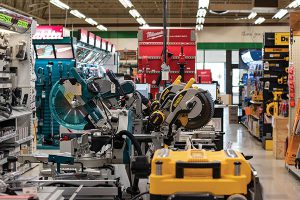 Supporting Brand Loyalty
Supporting Brand Loyalty
A common theme among these three retailers is the level of brand loyalty their professional tradespeople have shown and the need for those brands to be well-represented across the full line of products available.
Gemmen’s Home & Hardware as well as PaulB Hardware both recently remodeled their salesfloors and took advantage of that time to remerchandise their power tools by brand, rather than by tool type. Merchandising high-quality brands together allows a retailer to make use of the manufacturer’s signage, which helps show off a well-stocked department.
“When a professional buys into a brand, they’re going the whole way. They’re not coming into the store for just a reciprocating saw; they want a specific brand’s saw,” Groff says. “It makes sense to have all of that brand’s accessories, battery packs and other tools in the same area, because once they’ve purchased into a brand, they’re no longer looking over the selection to see which saw they like best.”
Brand loyalty also speaks to which brands retailers are bringing into their stores. While power tools at lower price points can appeal to homeowners and DIYers for projects in a home setting, professionals look for the tools that are more durable and more powerful. Most are willing to bring their price expectations in line with these top brands. Reaching out beyond the brands offered through a certain distributor and working directly with power tool vendors can help expand the selection.
Other required power tools products for contractors and professionals include the latest in battery-powered options. Portable tools are quickly overtaking corded options for even those intense jobs accomplished by framing saws, impact drivers and chainsaws, Branneky says. Drills with brushless motors are more popular than traditional brushed motors.
No matter what brands a retailer chooses to bring into their store, having the latest item on the minds of tool-obsessed professionals is key. Staying in touch with brand vendors and knowing about new products rolling out are ways to stay ahead of demand, Gemmen says.
With the level of customer loyalty present in power tools, the consumer will often know more about what tools are hitting the market than retailers because manufacturers often mail flyers directly to consumers. In addition, brand loyalty programs and trade publications keep customers informed about new products in their favorite tool lines.
“Bringing in the latest new product can be scary sometimes, because you don’t know what will sell or if this brand new product will just languish on the shelf. But we need to take that chance for us to be known as a tool source,” Gemmen says. “Sometimes it’s just about having the coolest new tool on the job site. But if a customer walks in and you don’t have it, they’re going somewhere else that does, and now you’re not reliable.”
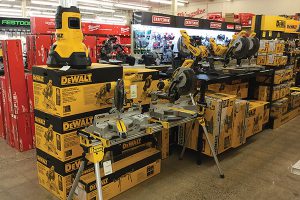 Presenting to the Pros
Presenting to the Pros
Merchandising has several key tenets, no matter the product group or category. For power tools, the trend toward brand-centric merchandising will likely continue as power tool manufacturers introduce more accessories and battery options designed to work specifically with their own product lines.
Some other ways to cater to pros are to make the products easily accessible on the salesfloor and putting the actual tools in their hands as often as possible. Make tools available for demonstration or encourage your sales associates to take the tool out of its packaging for a customer to handle.
At PaulB Hardware, outside sales associates often bring the latest power tools out on the road with them to offer demonstrations for prospective customers. The business also moved its stocked tools onto the salesfloor instead of storing them in secured back rooms and bringing them out once a purchase was going to be made.
This change was made to facilitate faster service for contractors, Groff says, but it has also exposed some products to greater threats of theft. While the change has been beneficial, it means employees must be more vigilant about observing the power tools department for missing inventory.
“We have always had a great training program that includes information about how to prevent theft. This move just means we have to be extra careful in these areas,” Groff says. “We have two employees who are checking inventory and doing cycle counts for the entire store. It’s about being intentional with how you’re stocking items and making it a priority to check our faster-moving inventory.”
Power tools can also be included in impulse categories if merchandised in the proper way. Most power tools have a variety of accessories and attachments that can be displayed in an engaging way to draw in customers.
Groff has often utilized “piles in the aisles” at PaulB Hardware to showcase bundle packages of items like drill bits that can attract a professional. In addition to making these bundles more visible both around power tools and in high-traffic areas, showcasing prices based on bulk purchases can be an advantage in tools and consumables like screws and nails. Highlighting deals around the tools that need these accessories can increase the chance of a larger purchase.
Along with merchandising power tools in an accessible way, retailers should consider storage options available through different power tool brands. Similar to having the latest type of tool, these storage options are often flashy items that are attractive to brand-loyal customers and make great add-on sale options.
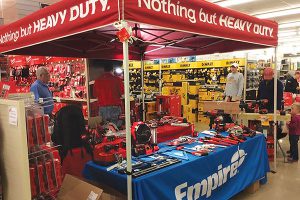 How to Maintain Relationships
How to Maintain Relationships
Tools break. Given the daily abuse power tools are subjected to in a professional environment, even the highest-quality tool will eventually succumb to time and stress.
Retailers can assist their professional customers in multiple ways in this area. Most power tool manufacturers offer robust warranty options for their tools. While these programs often allow customers to go directly to the manufacturer, a retailer who takes on some of the stress and confusion can garner positive feelings from customers.
Gemmen’s Home & Hardware as well as Branneky True Value Hardware have systems in place to assist customers with submitting power tools to manufacturer warranty programs. Knowledgeable staff members help customers figure out what the issue might be, and should it need to be submitted for service, the assistance can make a stressful situation much easier.
“It allows us to add value to what is already a high-ticket item. Customers can come to us, and we take care of the shipping and paperwork,” Gemmen says. “It’s one less thing on our customer’s plate and adds a lot of goodwill on our part.”
PaulB Hardware has built its service department to offer in-house repair with certified service employees through several vendors’ warranty programs. Instead of sending the tool to the vendor for service, repairs can be done in-house.
“We’re seeing several manufacturers who won’t offer warranties for items bought online. When we have this conversation with customers, we’re saying that if this tool breaks, you’re dealing with us and not sending it back to Amazon,” Groff says. “They’re willing to come here and buy here because they’re talking to the person who will work on their tools.”
Another way to add value to purchases is hosting events that cater to their needs. PaulB Hardware conducts an annual May Tool Day where vendors set up booths for a small fee and interact with professionals who attend the event. It allows the kind of face-to-face interactions with knowledgeable manufacturer reps that contractors appreciate.
While contractors and tradespeople are often looking at the nuts and bolts of pricing, product selection and convenience, the building and maintaining of a relationship can’t be overlooked. Once a professional knows a retailer can be relied on for the right tools for the job, the retailer now becomes an option for a purchase. If that purchase is followed up by strong customer service and enjoyable interactions, a retailer can become the only option that pro will want to patronize.
“It’s about building goodwill and knowing the kinds of problems the professional customer is dealing with,” Branneky says. “If they know you are in the best position to help them accomplish their job and not add stress to it, then the relationship goes beyond just selling tools.”
 Hardware Retailing The Industry's Source for Insights and Information
Hardware Retailing The Industry's Source for Insights and Information







